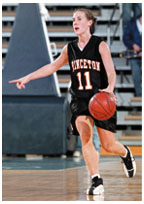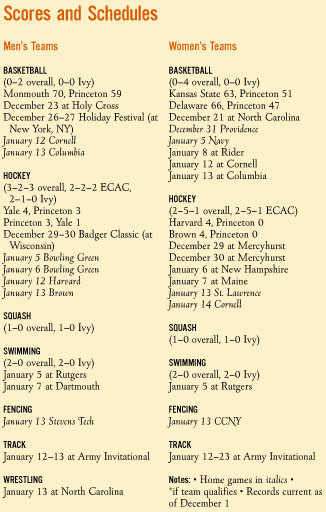|
December 20, 2000: Sports Ice-cold
"Killer" New
faces on the hardwood Sports Web Exclusives! Matt Golden's From the Cheap Seats column
Every team needs a sniper, a cold-blooded assassin who will take and make the big shot when the game is on the line. Princeton women’s ice hockey coach Jeff Kampersal ’92 is lucky enough to have such a player. Junior center Andrea Kilbourne, known affectionately as “Killer” by her coach and teammates, is the Tiger with the steady trigger finger. Of his lethal weapon, Kampersal says, “Andrea is our best, most aggressive player. She has that combination of passion and skill that makes my life as a coach so much easier. And she was a leader by both example and word from the start.” According to Kilbourne, the Tigers’ captain and leading scorer, her moniker originated during high school and was cemented as a freshman at Old Nassau. She burst onto the collegiate hockey scene and gunned down the competition by recording 44 points, five Ivy League Rookie-of-the-Week awards, All-Ivy honors, and second-team ECAC honors as a freshman. However, Kampersal points out that his star center’s demeanor on the ice does not necessarily reflect her nickname. “She’s our superstar,” says the coach. “But she is also the most humble, gracious player on the ice, which is a nice combination. Her killer instinct comes from her ability. She is a powerful skater, and while she might not finesse the puck, nobody will knock her off it.” Kilbourne would prefer to go quietly about her business on the ice than to draw attention to herself. “I’d rather go out there and let my hockey do the talking” she says. “I don’t like confrontations when I don’t think they’re necessary.” But Killer is not afraid to step in when things get chippy at the rink. “In women’s hockey, there is no body-checking,” says Kilbourne. “That being true, if you hit somebody quietly, the refs rarely say anything.” Attention may be hard for Kilbourne to avoid in the near future. Her coach believes that she has a legitimate shot at making both the 2002 and 2006 U.S. Olympic women’s ice hockey teams. He says, “For Killer, all that needs to happen is for her to be in the right place at the right time.” Kilbourne would love to represent her country, but has more immediate concerns for now. “Playing in Salt Lake City in 2002 would be a dream, especially since in this league I am playing with some girls who are going to be in the mix in two years,” says Kilbourne. “But right now, my personal goals are the team’s goals.” Kilbourne defines her team goal as the Ivy League title. But Dartmouth, ranked number-one nationally, is the heavy favorite to claim the league crown. The Tigers fell to the Big Green in the season’s home-opener at Baker Rink, 3–2. “We outshot them and beat them in five-on-five play,” Kilbourne observes, still optimistic about the Tigers’ chances. (Two of Dartmouth’s goals came on power plays.) Kampersal’s aspirations lean more toward earning an ECAC playoff berth. In a talent-rich league, he knows this will not be easy. “Plain and simple, this league is very tough; there are no cupcakes anymore,” says Kampersal. The Tigers (2–5–1 ECAC) have gotten off to a slow start. After the defeat by Dartmouth, Princeton suffered a disappointing 3–1 loss to Ivy rival Yale. Facing a rematch with the Bulldogs the next day, the Tigers looked to their leader. “The girls were really down,” said Kampersal. “But in the second game, I pulled [Kilbourne] aside at the beginning of the third period and challenged her to score, to raise her game up a level.” Killer accepted the challenge and 44 seconds into the period sighted the net in her crosshairs and blasted the game-winning goal. However, Princeton was not able to gain any momentum from the Yale game and dropped a pair of 4–0 decisions to Harvard and Brown the following weekend. Kilbourne understands that the Tigers must raise their level of play if they want to be serious contenders in the ECAC. And though she is playing well individually, Killer remains focused on the hunt. “All I am thinking
about right now is the team. I am not one to keep track of points
or goals. That just doesn’t matter to me,” Kilbourne says.
“I could be last in the league in scoring, but if we were getting
more of those W’s, I wouldn’t care at all.” By Patrick Sullivan ’02 Patrick Sullivan is a frequent contributor to PAW.
The Princeton women’s basketball team will don the traditional orange-and-black this season, but fans may notice a hint of green among the Tigers’ ranks. Senior cocaptain Jessica Munson will be fitted for a cap and gown this coming spring, but the three-year starting point guard will be surrounded by an inexperienced bunch this season. She is joined on the Tigers’ roster by two juniors, four sophomores, and six freshmen. And the man charged with bringing this group together will be a new face as well. Interim head coach Kevin Morris was hired in mid-August after former coach Liz Feeley bolted Princeton to accept the head job at Division III Smith College in Massachusetts. Princeton will conduct a national search next spring before filling the position on a permanent basis. The Tigers face an imposing early-season schedule, and after dropping their first three games of the season, it’s evident that scoring points will be a chore. Princeton lost its opening game to Lehigh, 64–38, and then got thumped, 69–33, by host Oregon State at the Beaver Classic. In the tournament’s consolation match, the Tigers showed some signs of life and hung tough with Kansas State before falling, 63–51. Regarding his offense, Morris said, “We’ve got to get better at the fundamentals, and that includes elements as simple as passing and dribbling. Teams are going to pressure us early in the game because of our youth. When we get pressed, we’ve got to handle the ball with greater care. If we can control the tempo and slow things down, we can keep the game low-scoring. To win games, we need to keep the score down. We have some girls who can shoot. There is no question about that. But we have to create good shots before we can expect to put a bunch of points up on the board.” The graduation of Maggie Langlas ’00 and Kate Thirolf ’00 last spring, both four-year starters at Princeton who each racked up more than 1,000 career points, has sapped the Tigers of their main scoring threats. None of the returning players averaged more than seven points per game for last season’s team, which finished just 9–19 overall and 6–8 in the Ivy League. Morris will start a senior, two juniors, and two sophomores. In addition to Munson, five-foot, 10-inch Lauren Rigney ’02 will be a perimeter player who can also post up in the paint. Allison Cahill ’03 is a shooting guard who averaged seven points per game off the bench last year. She’ll play a more integral role this season. Junior Hillary Reser will also provide leadership on the floor at the forward position. Sophomores Maureen Lane and Lee Culp will rotate at the center position, but Morris will at times employ a big lineup that features both players simultaneously. Lane, a six-footer, scored 14 points in the loss to Oregon State, while Culp (who stands five feet, 11 inches tall) netted a season-high 17 points and grabbed 10 rebounds against Kansas State. The Tigers face a difficult schedule. They dropped a 66–47 decision to the Delaware Blue Hens, favorites to win the American East Conference, on November 29. Princeton also plays three tough North Carolina schools (Elon, High Point, and North Carolina-Wilmington) in December. Ivy League play doesn’t begin until January 12, when the Tigers visit Cornell. Princeton’s home Ivy opener is on February 9 against Dartmouth. The Big Green, along with Penn and Harvard, are the preseason favorites in the Ivy race. “The beginning of the season will be very challenging,” says Morris. “It’s sort of a delicate balance in that you want to play good competition to get better, but you want to build some confidence as well. The girls have been practicing very hard, so I think that in itself will build some confidence. “I’m not too
hung up on numbers right now, I just want to play hard and compete
every night. If we can play hard and compete in all 28 games, I’ll
be satisfied.” By Mark Gola Mark Gola is the author of the Louisville Slugger Complete Book of Pitching.
|
||||



 The
learning curve for this team will have quite a few twists and turns,
according to Morris, who spent two years as an assistant at Harvard
and the past seven as the head coach at Fordham. He says, “There
is no question that we’re very young, but we hope to learn
and improve quickly. The bottom line is that we have to play defense.
We’ve got to control the tempo of the game, and to do that,
we’ve got to take care of the basketball. The girls have worked
very hard in practice, and the few returning players have provided
great leadership.”
The
learning curve for this team will have quite a few twists and turns,
according to Morris, who spent two years as an assistant at Harvard
and the past seven as the head coach at Fordham. He says, “There
is no question that we’re very young, but we hope to learn
and improve quickly. The bottom line is that we have to play defense.
We’ve got to control the tempo of the game, and to do that,
we’ve got to take care of the basketball. The girls have worked
very hard in practice, and the few returning players have provided
great leadership.”
